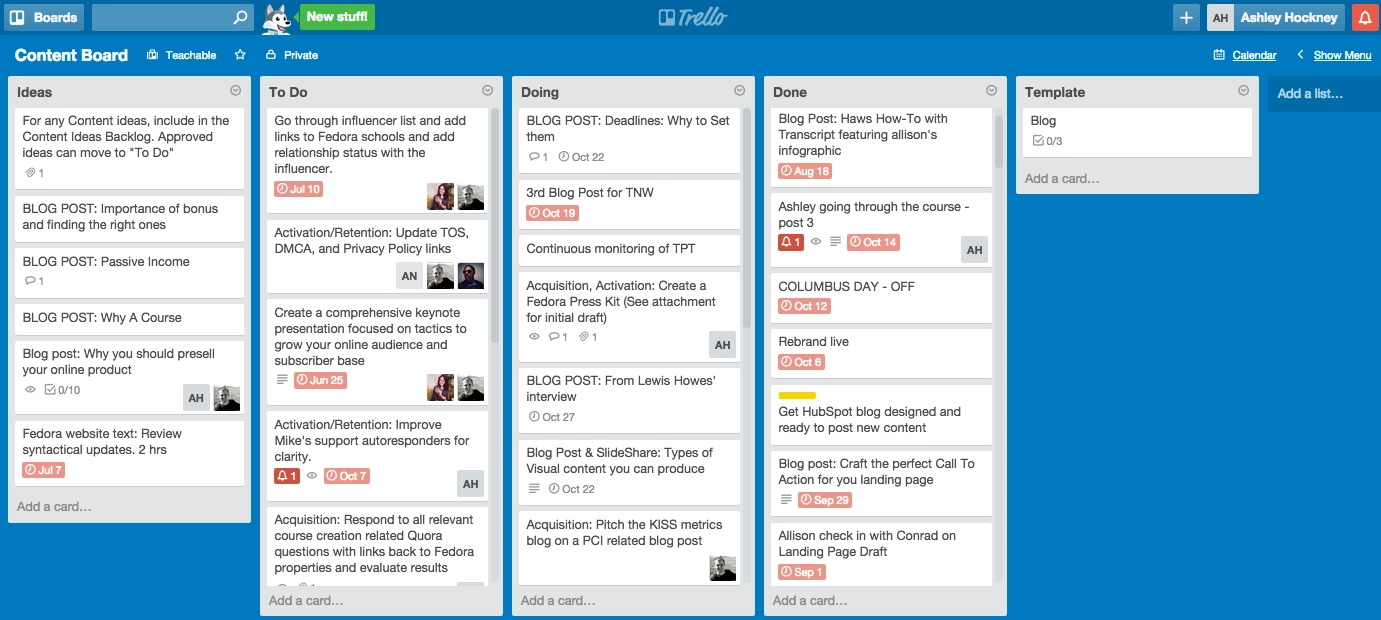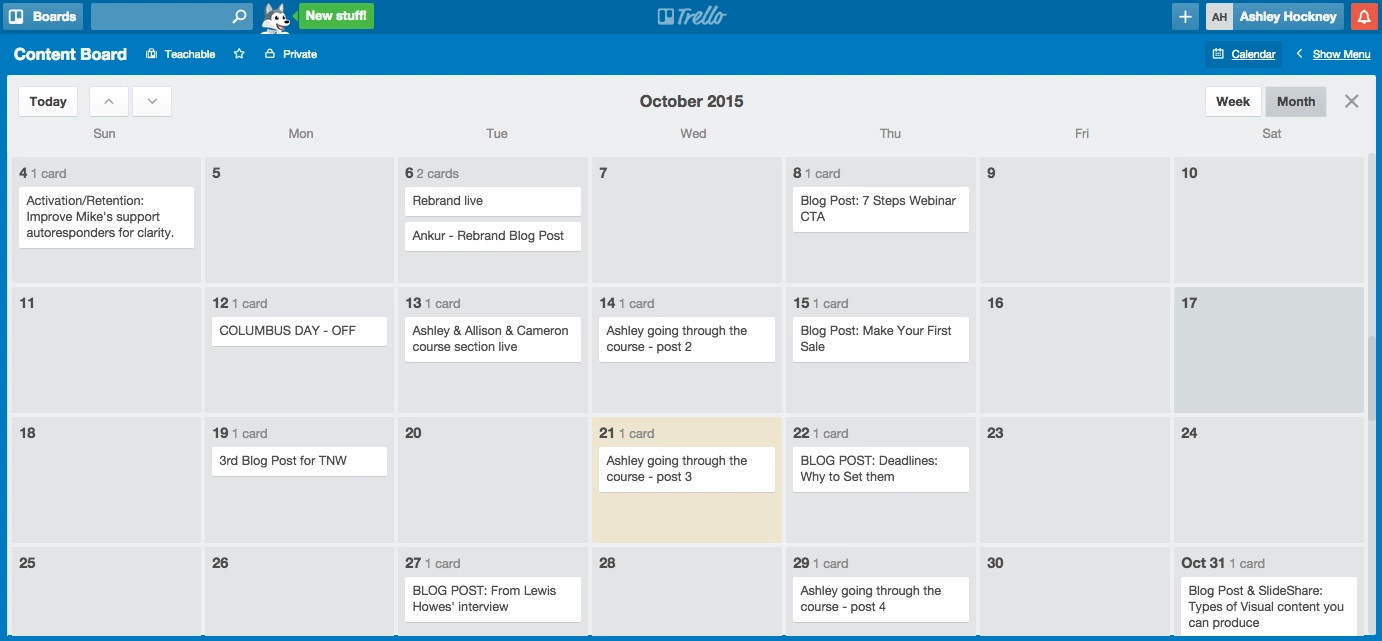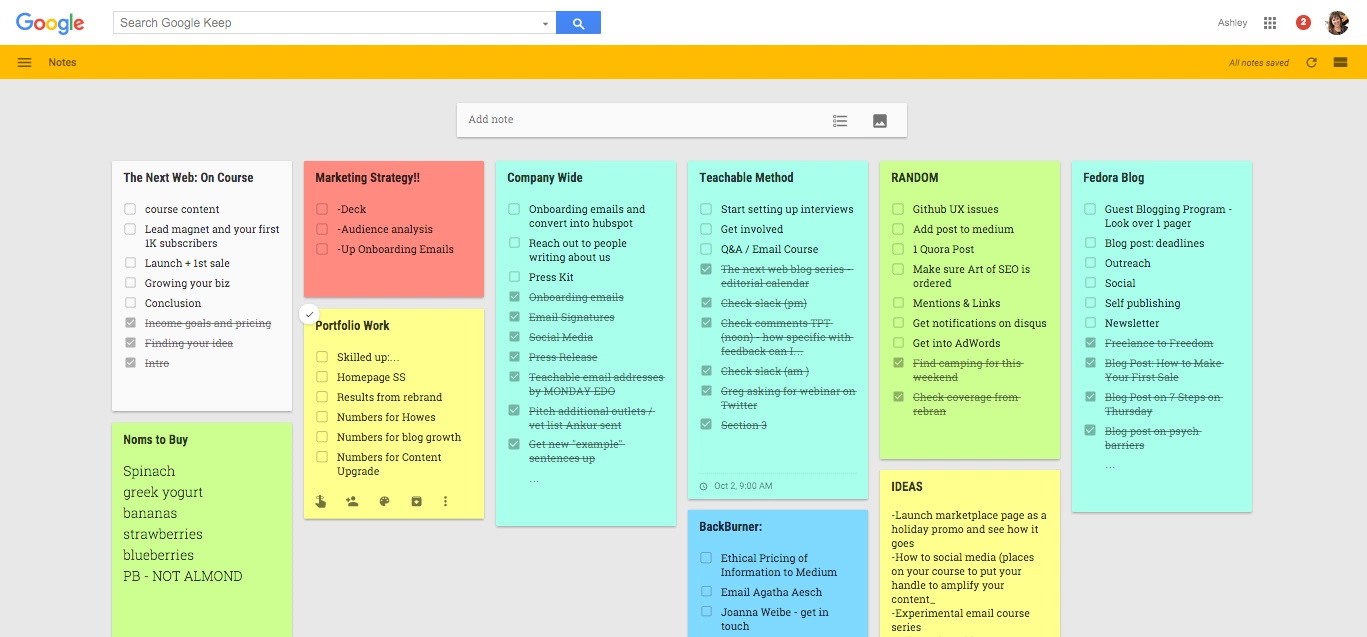I’ll do it tomorrow. I’m a little busy right now. Not the priority. After this project dies down. Excuses. All excuses.
It’s a common human flaw that while we want long term goals, we have a very hard time sitting down to actually accomplish them in an effective manner.
I’m no exception. I talk about how I want to go to the gym, but book dinner dates with my friends instead. I talk about how I’d like to manage my work tasks more efficiently but follow my same old routines. I talk about how I’d like to change my life, but I never take the steps to do it.
No more.
In this post, we’re going to address the issue head-on. We’re going to talk about the psychology behind procrastination, the steps you can ACTIONABLY take to become more efficient (which I personally vetted through to find the most effective), and the free apps and tools you can use to help you along the way.
Why am I doing this? Because I want to help you start your business be it an online course, a blog or even selling pet rocks. I don’t care. I know the frustration with procrastination and I’m here to help.
We all procrastinate, but to varying degrees, so I investigated.
Psychology Today synthesizes a procrastination study done at the University of DePaul defining three various types of people who procrastinate, people who like the rush of finishing at the last moment, avoiders who might be afraid they’ll fail so why complete a tasks at all, or people who can’t make a decision.
While I find this to be true, sometimes procrastination comes from boredom, confusion or fear.
For instance, we’ve seen people procrastinate on making a course because they don’t know how, they’re afraid to put themselves out there, or they just don’t think they have time.
The one answer we’ve found that works best in this scenario is to set a deadline.
A deadline also helps streamline your work and keep you on track. Have you ever noticed that a task takes as much time as you have to complete it?
Fast company defines this as Parkinson’s Law which says:
“Parkinson’s Law: work expands to fill the time available for its completion…As Joel Falconer writes at Lifehack, the outcome of Parkinson’s Law is that if you give yourself a week to work on a two-hour task, then the task will grow in complexity as to fill that week—perhaps not with more work, but more anxiety about the work.”
Set a Deadline
I think of a deadline as a promise to myself. Without which, I’m scattered.
Or in the words of Antoine de Saint-Exupery (who wrote The Little Prince): A goal without a plan is just a wish. It’s true. Without a deadline, I don’t even have anything to procrastinate on, I just have an idea.

Photo courtesy of JoyfulJobot
Ty Kiisel, writing for Forbes says, “I’d guess I’m not the only person to have occasionally worked with people who talked like they could get stuff done, but never seem to get stuff done. Planning, prioritizing, and preparing are all important, but execution is where the rubber hits the road. Over the course of my career, the biggest successes I’ve ever seen are those people who are able to execute. I’ve also seen careers cut short because when push came to shove they couldn’t make it happen.”
Truer words have never been spoken.
So the first thing I do to get myself moving is to set a date with these points in mind…
1. Break down your large task into small attainable goals
When thinking about how to build an online course business, the first thing we suggest is to break down what you’re teaching into small actionable steps and to make each major step a “module” in your course.
Set dates for finishing each module. These are much more achievable goals than one date that reads “DO ALL THE THINGS.”
The same can be said for any online business. It’s best to break down a large goal into actionable steps. In Inc’s words, “Complete big project by Friday” is not an action item. Start with the biggest tasks and break them down into individual steps that have their own deadlines.”
This not only helps make goals actionable, but it will help you manage your own psychology.
I agree with Entrepreneur when they say “It can be overwhelming when your to-do list is changing and priorities seem to be wrestling each other, but starting with small, manageable jobs can help thwart fears and minimize anxiety.”
2. Set realistic goals
The follow up to the above point, remember to set realistic goals. Your goals should push you to get things done, but they shouldn’t be so unmanageable that you’ll never want to repeat the process.
BidSketch says, “Since you don’t want to stop dreaming big, the best way to find a balance is to simply set “macro goals” and “micro quotas.” I like these two words. I think it makes it simple.
“Your goals should be the large scale things that you hope to accomplish, that much is obvious. But your quotas are what you must get done every day to make it happen. For instance, writer/designer Nathan Barry forced himself to write 1000 words per day come hell or high-water to get his 3 self-published eBooks done. The quota made each day approachable, and the goal was achieved because of it.”
Specifically if you’re creating a course, one module a week seems manageable while also holding a full-time job and having family/social obligations, what isn’t so manageable is two modules a day of fresh content.
A key defining this is to be SMART: Forbes says that smart goals are
- Specific
- Measurable
- Attainable
- Relevant
- Time-bound
3. How to schedule a deadline
As someone who has been given urgent deadlines that just weren’t attainable in the allotted time, I’ve moved forward in my career trying to do the opposite. I give everyone around me as much time as possible and am disappointed when tasks are pushed to the last minute and deadlines aren’t met.
Doing a bit of research, there’s a much more effective method. Schedule a deadline for the same day of the week.
Detailed by Fast Company, “A deadline can appear more present if it’s scheduled for the same day of the week as the day it’s assigned. If today is Wednesday, for example, and the deadline is set for next Wednesday, you’re more likely to start working on the task sooner than if the deadline is next Thursday or Friday.”
Continuing with counter-intuitive psychology hacks, Tim Ferriss gives pretty interesting insights on his own deadlines in this YouTube video.
One key takeaway that course builders should keep in mind is that it’s hard to generate content efficiently (especially written content) for more than four hours a day. Keep this in mind as deadlines and editorial calendars are being built.
4. Communicate your ambitions
Another tip is to communicate your goals with your friends and family. One of the major reasons I put off my goals is because I’m constantly in conflict with opportunities and obligations presented by friends and family.
However, when taking on large projects, I make sure to let my network know. This has many benefits. Firstly, it’s sets expectations about my availability and makes it easier to say no to nonessential obligations. Secondly, it sets up a support network.
When I was taking on a large research project in college, I communicated my goals and my friends and family not only gave me creative space but offered words of encouragement and some even connected me with valuable business partners. It’s a way to naturally network.
With these three points in mind, it’s time set a hard date. To keep yourself accountable and manage your schedule, there are a few tools you can use.
1. Trello
Trello advertises itself as “the free, flexible, and visual way to organize anything with anyone”. A big statement ut Lifehacker calls it, ”an awesome project management tool that makes collaboration easy and, dare I say, even fun.” Internally at Teachable, we use it to outline our editorial calendar. I find it a bit cumbersome for EVERY task, but for outlining a specific project, it’s fantastic. Here’s a peek at how we use it:
Here is our view of ideas, to-dos, current projects and complete tasks.

This is what they look like plotted out on a calendar.

2. Google Keep
Google Keep has been touted as THE organization tool. While I have to admit that it was hard to let go of the good ol’ fashioned pen and paper, I really like Google Keep. All my lists are in one place and my notes are color coded by priority.
The Google Keep app is also available on android or apple phones.

3. Boomerang
Boomerang lets you schedule your emails and ping you with follow-ups based on if someone else has responded or if you’ve responded. It basically makes management simple. I also find it handy for my 2am productivity binges. Set your emails to send at 8am not 2am and no one will know you’re a crazy workaholic.
4. Google Calendar
By now, I think most of us are familiar with Google Calendar. If I have a reoccuring to-do, like importing student email addresses to Mailchimp every Wednesday, it’s a great place to schedule and get reminders.
While our GCals get busy, I know I’m also prone to forget the small things, so by giving it the space of an important meeting, it reminds to get. it. done.
Get Motivated
It’s one thing to set a deadline, it’s another altogether to get working on it. Here are a few things that work for me as motivators and a few adapted ideas from Entrepreneur.
1. Get your first customer
Having just one customer who has paid for your product is going to change things. With your first sale comes the realization that your idea and dream of building a business can become a reality. Not to mention, cash in the bank is an ultimate motivating factor.
A customer also keeps you accountable. If you’ve promised to deliver by a date, the pressure is real to meet that deadline.
2. Speak positively
Words have power and if you talk about your business as a hypothetical, it probably is, and if you talk about it as something happening, it probably will.
As Entrepreneur says, “Change your choice of words when you’re out in the world. Talk about your company like it is a business, not like it’s about to be a business–“I’m trying to start a business” sounds noncommittal. Even if all you’ve done is print your own business cards, saying things like “I own my own business,” or “I have to get back to work,” will get the word out that you are serious.”
This has the twofold benefit of keeping you socially obligated. If I tell my friends I’m launching a course in one month and then fail to do it, well, that’s embarrassing. Social and peer pressure can be a great way to keep you moving. Friends can also be a great support system.
3. Reward yourself
If you do the work to meet a deadline and hit it successfully, it’s time to celebrate! Acknowledge your own hard work and give yourself credit for meeting your goals. It’s hard!
Now, I’m not talking blowing all your money if you make a module by Friday, but small treats and mental notes help with positive thinking and avoiding burn-out.
If you’re constantly working to hit deadlines and never stop to acknowledge your own successes, you’re going to feel terrible and you’re not going to want to keep working.
4. Keep your goal in mind
At the end of the day, in the midst of outlining plans, creating content and networking with well formatted, tiring emails, you’ve got to remember your goal. Remember why you decided to launch your own business or course in the first place.
I am the Queen of signing up for large projects, and making life-changing decisions only to six months later think: How did I get here?
For me, there’s a very simple remedy. When you decide to create a course, sit down and tell yourself why and write it down. This doesn’t have to become a painting on your wall, or a mantra you repeat in the mirror each morning. A simple note to remind yourself why you started something can help motivate and focus you further down the line.
Avoid This One Major Pitfall
Now, there is one major pitfall we see time and time again that’s going to stop you from reaching your goal: Focusing on perfection.
DON’T DO IT!
I know that sounds counter-intuitive because you always want to give as much value to your customers as possible and create high-quality content, but aiming for perfection, well, that’s going to slow you down.
If you’re laser-focused on perfection, you’re going to get caught up in small details that don’t matter. You’re going to slow down over things that need to be completed quickly. You’re going to stress yourself out and hate your work because here’s the honest truth: no one is perfect.
We all make mistakes, using a filler word in a video, forgetting a comma in a blog post, including a typo in a newsletter. While you want to try to avoid these things, it’s not worth re-recording a 20 minute otherwise great video because you used “umm” in the 18th minute.
The Marine Corps use a 70 percent rule: “If you have 70 percent of the information you need to make an informed decision, you have 70 percent of the resources you think you’ll need to get it done, and you’re 70 percent sure it will work, execute. A well-executed plan that might be imperfect garners more results that taking no action at all. Perfection doesn’t exist.” (Forbes)
As someone who was always an A+ student, I know how hard this an be, but it’s absolutely necessary for your business.
If you don’t want to take my word for it, Entrepreneur agrees saying, “It might seem ideal to have everything in place exactly as you envisioned, but perfection doesn’t pay the bills.”
This parallels Facebook’s mantra: Done is better than perfect. The mentality is explained by Fast Company:
“If you’d entered Facebook’s headquarters sometime around 2010, you’d have seen a sign painted on the wall: “Done is better than perfect.” I have no doubt that if you walked into the offices of any Fortune 100 brand you would see no such thing. Their legal, compliance, or human resources departments would insist on it being removed. And yet, had Facebook waited so much as a year to perfect its model, the company might very well be where MySpace is today.”

With these tips and tactics in mind, it’s time to stop reading this post and get to work! Let me know in the discussion board below if you have any other tricks. I would love to hear.
Join more than 150,000 creators who use Teachable to make a real impact and earn a real income.


